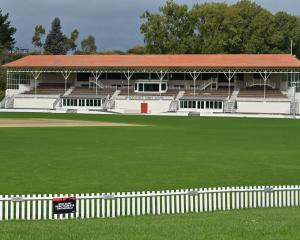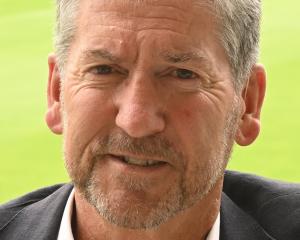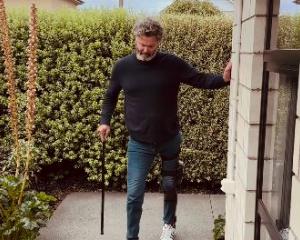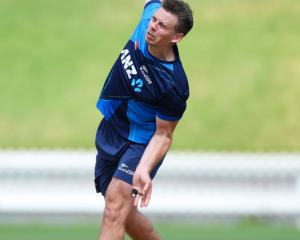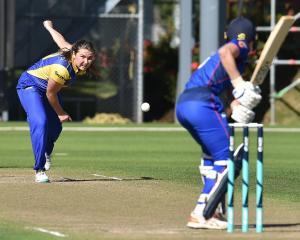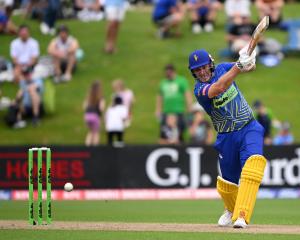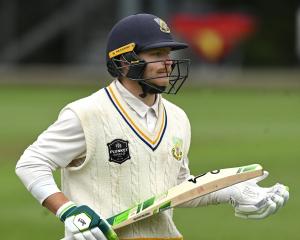Former Otago cricketer Chris Gaffaney's elevation to the ICC elite panel caps a rapid rise in the umpiring ranks. Hayden Meikle catches up with the man who has gone from whites to white coats, with a decade in blue along the way.
Hayden Meikle: Did you always think you'd become an umpire after your playing career?
Chris Gaffaney: When I was playing, my only focus was to consistently put up strong performances with the bat and be considered for the Black Caps.
However, when I realised that this was probably not possible, I started to think about umpiring because this seemed to be a good option to remain involved in cricket.
HM: Did you think it would be simple to move into umpiring?
CG: I thought it would be a relatively smooth transition.
It certainly wasn't and I now believe it is one of the toughest sports officiating roles in the world.
Players expect you to be perfect and get better as the game goes on.
Unfortunately, this doesn't always happen.
That is the beauty of the challenge.
HM: How do you ''study'' to become an international umpire?
CG: A lot of hard work, study and preparation.
Lots of reading and understanding the laws of the game and playing conditions, and regular simulation exercises.
Cricket is blessed with three vibrant formats and the playing conditions, as well as pace and demands of each format, are slightly different.
Umpiring also requires man management and communication skills.
When I played, I had no idea how many laws and different interpretations there are.
HM: When and where did you make your first-class debut as an umpire?
CG: Northern Districts v Auckland at Gisborne in the State Championship on March 14-17, 2008.
HM: And your international debut?
CG: September 2010. An ODI between Canada and Ireland in Toronto
HM: How many tests/ODIs/T20 internationals have you done?
CG: Two tests, 41 ODIs and 15 T20Is to date.
HM: Do you get nervous before standing in a big game? Are they different nerves to, say, facing Shane Bond at his fastest?
CG: There are always butterflies in the stomach before a match, no different to when I played.
Part of the job is to control those feelings, get on to the business at hand and make the best decisions to the best of my ability.
Just like the players, you try to get into the swing of the match as quick as you can and then rely on your processes.
It required different skills to deal with Shane Bond when he had the cricket ball in his hand.
It certainly got the blood flowing when he was charging in.
HM: Do you need to find a balance between letting the players know who is boss, and maintaining a friendly relationship with them?
CG: The game is for the players.
I'm more than happy to sit back and watch the players show us their tremendous skills and not get involved.
Umpiring is not about showing who is the boss.
It is about managing the game so that it is played to its rich traditions and values, as well as in accordance with the Spirit of Cricket.
HM: You're still very young (39) and I imagine you have umpired a handful of guys you played with. Was that ever difficult?
CG: In the beginning, it was an interesting challenge.
I knew a lot of the players very well and had played with and against a lot of them.
It was good fun and there was always a fair share of banter.
Knowing them well gave me that immediate relationship with some of the players which helps in managing the game.
At no stage was it difficult, as we were doing our respective jobs.
HM: What about the technology issue? Is there still a place for old-fashioned human judgement in top-level cricket?
CG: Technology has been introduced to assist umpires, improve correct decision-making, eliminate howlers and provide clarity to the spectators.
I, like my colleagues, support the use of technology because we take it as a tool to improve our performance and correct decision-making.
But at the same time, technology is evolving and I know that the ICC is working extremely hard with the suppliers to ensure that best available technology is at the disposal of the match officials as well as the players.
HM: Fans and media can be very tough on officials making mistakes. How are you finding the extra scrutiny and criticism that comes with life at the top?
CG: This is part of the package and the match officials, like the players, learn to take this in their stride.
As in any other walk of life, there will be judgement errors as the game is played by humans and everyone views an incident from their own angle and perception. Unfortunately, our mistakes are very public.
You learn from those mistakes and move on as the ultimate target is to improve.
HM: What is your schedule of games in the coming months?
CG: The ICC announces appointments before the start of each series. I suspect it will be very busy with so many series going on around the world.
HM: What's the ultimate goal? World Cup final? Boxing Day test? Ashes test at Lord's?
CG: An Ashes test at Lord's or a Boxing Day test at the MCG is a more realistic ambition than a World Cup final - for me to officiate the final means New Zealand does not feature!
HM: Do you know the other blokes on the elite panel? Do you go out for tea and compare lbw decisions?
CG: I have worked with the match officials in the past, more recently at the World Cup.
I have a good rapport with them and have enjoyed their company. They are not shy of sharing their views and experiences, and have been supportive of me.
I consider myself very fortunate to be in the group of such quality match officials.
HM: Will you stay with the police or resign to do umpiring fulltime?
CG: I have been in the police for 10 years. The last two years of my playing career with Otago overlapped with me joining the police.
They have been extremely supportive of firstly my playing career and more recently my umpiring.
Without people like Paul ''Moose'' McLaughlan and Mel Aitken, I wouldn't have been able to combine the two roles.
Now, being a fulltime umpire, I am unable to continue my role as a constable so I have had to resign.
HM: Are there elements of police work that translate to cricket umpiring? Man management, authority, attention to detail and rules?
CG: All of the above.
Sometimes, out on the field with the situations that have arisen, I felt like I could have been at an altercation in the Octagon on a Saturday night while working for the police.
I have been very fortunate with the training I have received in the police, along with completing a management degree at the University of Otago.
These have provided me with the appropriate skill set along with my playing background to deal with most things that arise.
HM: What does the family think of your umpiring exploits?
CG: I have been married to my beautiful wife Sarah for 14 years and we have four children - Max (10), Molly (8), Rosie (6) and Samuel (4).
They have made a lot of sacrifices for me to follow my goal but with my promotion to the elite panel, they are very excited.
I may be away a bit more now but the benefit now will be that when I am home, I am home, and I will not have to rush off to my police job.
More family holidays are high on their agenda.
HM: You retired from playing relatively young. Any regrets?
CG: I made my choices and I have no regrets. My playing career didn't turn out how I planned but with that door closing, another opened.


